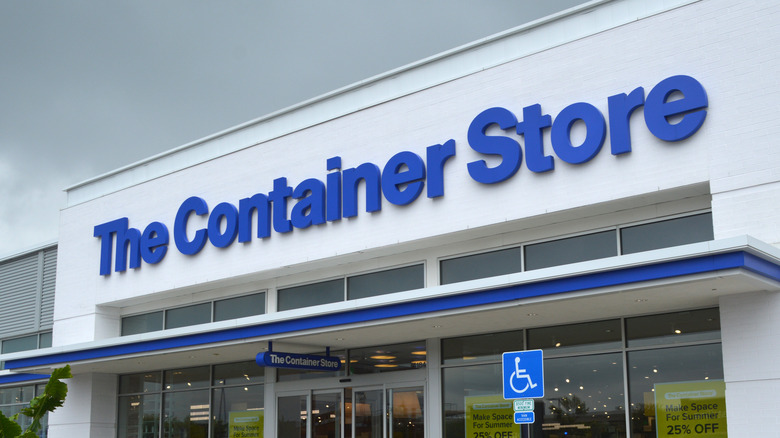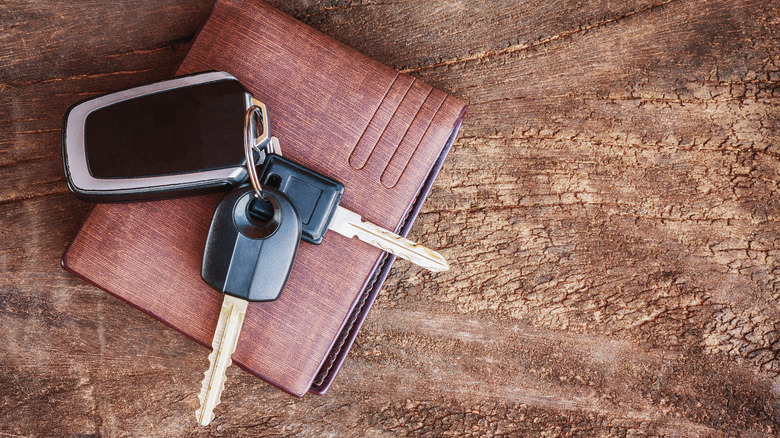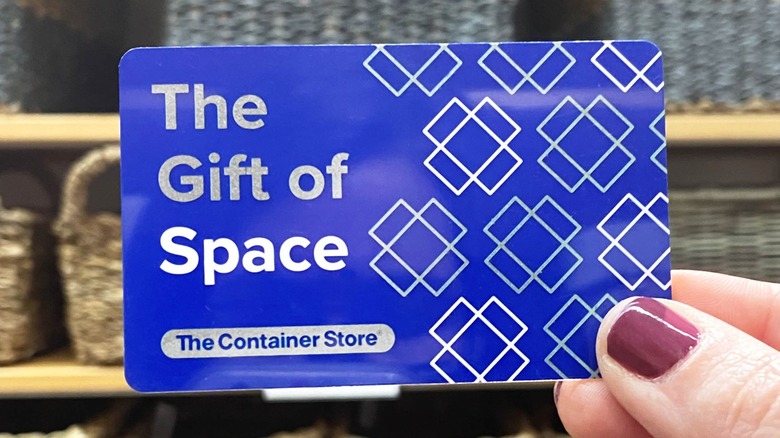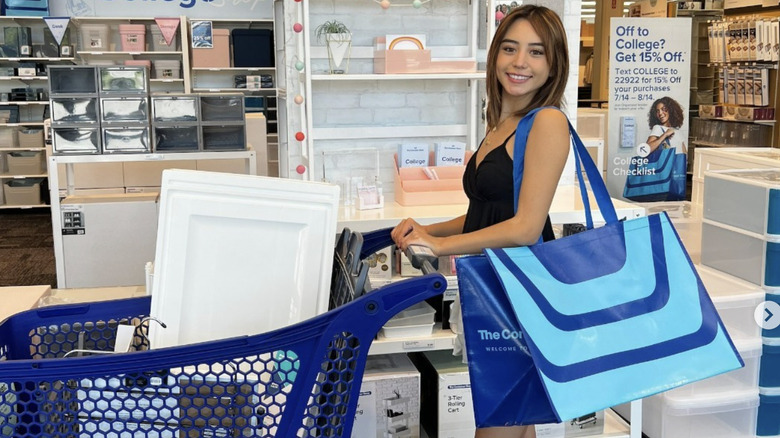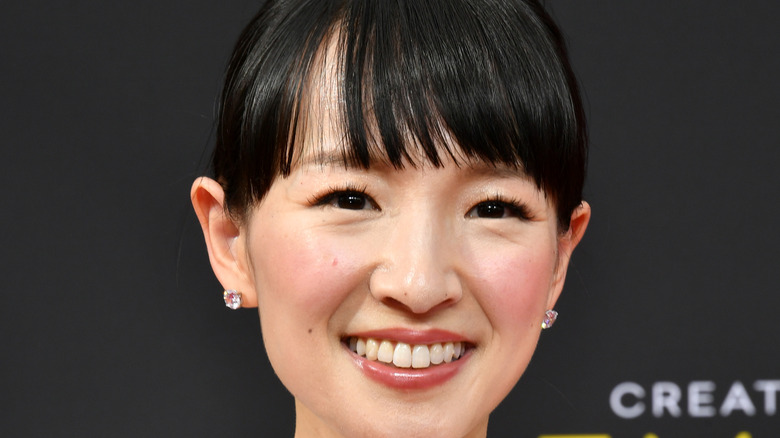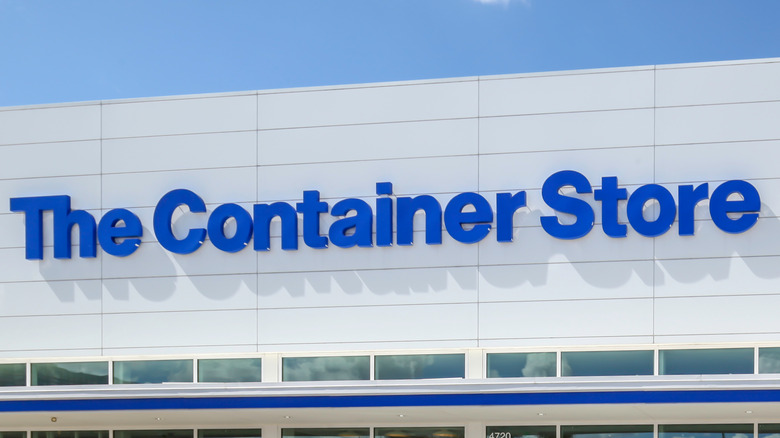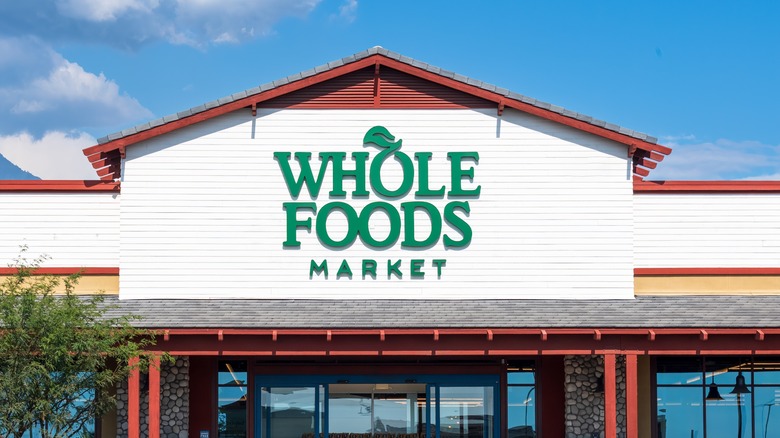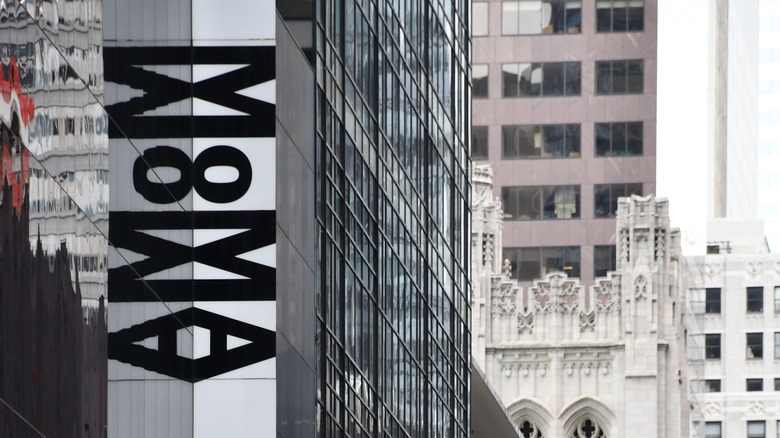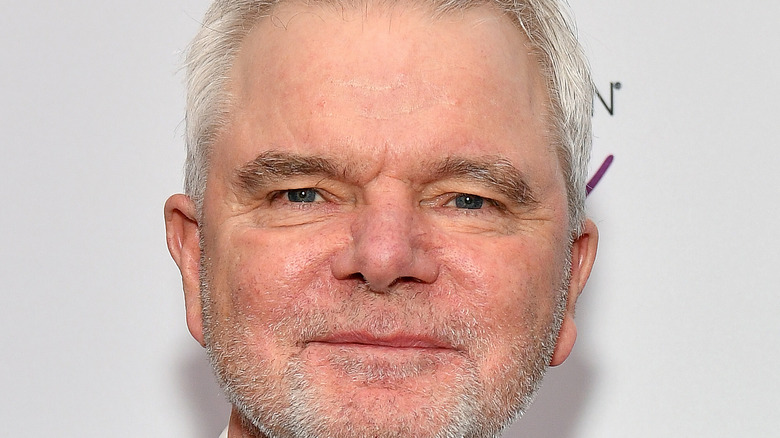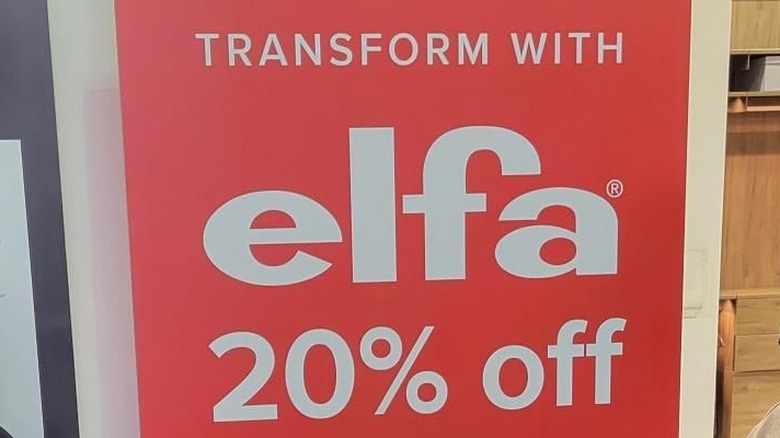Facts Only Savvy Shoppers Know About The Container Store
It's hard for fans of The Container Store to contain themselves when talking about how much they love shopping there. According to The Motley Fool, the store builds this enthusiasm by following the tenets of conscious capitalism — a form of doing business in which retailers focus on stakeholder wellness instead of shareholder wealth. In following this business practice, The Container Store has had a few variations in its stock prices since its IPO, although profits remain high and employee turnover low.
Fans of the store like Lisa Archilla of Bee & Peacock Organizing, credit The Container Store with changing her life for the better. As a former employee of a retail location, Archilla gained the skills she needed to step out into the home organizing space and start her own business. Whether you are a professional organizer (we are looking at you ladies of "The Home Edit") or just like shopping at a place that smells really clean with friendly employees, we have you covered. Here are all the facts about The Container Store that only its most dedicated fans know.
The idea for the Container Store came about when the founder couldn't find his keys
Founders Garrett Boone and Kip Tindell met each other in the 1970s when working at a mail-order company called Montgomery Ward. According to the Fort Worth Star-Telegram, originally, the pair wanted to start a furniture store in a mall, but there already was one, so they could not secure the funding to open it. While visiting a trade show, the pair noticed a display of stackable containers and this is when the wheels started to turn. Garrett Boone in particular was always losing his car keys, so he thought that there could be a lot of money in giving people a designated place to put them.
When the very first store opened in Dallas, Texas in 1978, it was the first of its kind on the market. Before, only commercial buyers could purchase items for organizing. The general public didn't have any options for purchasing similar items. Because of this, Boone and Tindell had to ask special permission from each wholesaler to purchase their products to be sold to the general public. The idea worked and the store took off, rapidly expanding from its Texas roots across the country throughout the 1980s and 1990s.
Employees love working there
As far as retail goes, most employees of The Container Store will tell you that there is no better place to work. This is because management has crafted a very specific company-wide strategy that puts the needs of employees above the needs of customers. According to CNN Money, this program has been in place for decades and positively impacts sales. Employee Dave Steinberg told the outlet that the store's lack of internal politics has a lot to do with employees feeling great about coming to work every day. "When I was a district manager at [another retailer], if I wanted to write a gift certificate, I'd have to ask permission," Steinberg said. "Here, there's no seniority, no politics. If someone comes in and asks to speak to a manager, I say, 'Okay, what can I do for you?'"
Years later, founder Kip Tindell reiterated this policy to Forbes, "We're an employee-first culture! Yes, we love our customers, but we believe that if we put our employees first, then they'll take better care of the customers. And when those two are happy, well then wonderfully the shareholders are happy, too!" This goes directly against the age-old saying "the customer is always right," but must be a solid strategy, as employee turnover at The Container Store is significantly lower than other retailers of similar size.
The Container Store has an intricate hiring process
Those wanting to join the team and experience this culture shift firsthand will need to submit to the store's unique process. According to INC., The Container Store is looking for people who are willing to go above and beyond for the customers in the store. These team members should be able to replicate the experience your grandparents might have had shopping in a gilded department store when they were young. It's very customer-focused and should be seen as a career, not just a job.
To achieve this, hiring staff at The Container Store first look for referrals from current team members. Each year, almost 50% of those who start working there know someone who already does. The Container Store doesn't claim to be an exclusive club, but rather that great people tend to know great people — leading to great referrals. If you apply, your job interview might last as long as three hours, so the hiring manager can really get a sense of your potential to fit in. During your first year working at the store, you will undergo a staggering 235 training hours. This includes an entire week of training about the company's vision, values, and product before even setting foot on the sales floor. This is definitely different from how most other retailers of this scale operate.
The retailer leans into emotions in advertising
Emotions are a very powerful force in advertising and The Container Store leans fully into this. According to Investor Relations, the retailer's 2022 rebrand was a nod to just how invested customers are in their feelings around the store. "At The Container Store, we have cultivated a unique and strong brand love because our customers have experienced the life-transforming benefits of an organized life," said Chief Marketing Officer of The Container Store, Melissa Collins. "Our new icon and branding campaign not only advances our brand, but also invites and welcomes new customers and reconnects our existing customer base through emotional storytelling. This new campaign, Welcome to The Organization, is one no one else can own."
For many, shopping at The Container Store is a complete experience, thanks to the ambiance of a well-lit, clean place with friendly employees. They return to shop there again and again not only because of good prices or quality products, but because of how they feel about themselves while shopping and immediately after. The Container Store sells possibilities to its customers and does so with a smile. Shoppers enter the space seeking a unique solution to a messy problem in their homes. When they leave, they feel in control of the mess and proud of cleaning it up and getting organized. It's a smart business move to recognize this dynamic and lean into it to sell more products.
85% of customers at The Container Store are women
Most retail stores want to appeal to a variety of different demographics to increase sales. If your product is desirable to many different types of people, you can likely make more money because more people are buying. The Container Store has a pretty different approach. Instead of pushing products on everyone, the brand leans into its established smaller base of loyal customers and highlights what they need, instead. For example, according to ABC News, 85% of customers at The Container Store are women. These women come from all walks of life. Some have just graduated from high school and are looking for college dorm storage solutions, while others are new mothers who want to keep their houses in order.
These women are busy and come to the store looking for a solution to the chaos of an unorganized space, not an overwhelming experience. "You want everything organized in a way where they can get into the store, find what they want and get out as rapidly as possible. And they'll reward you for that by coming back several more times a year than if it's kind of a maze in the way people used to design stores," founder Kip Tindell told the news outlet. Because of this, the store has wider aisles, and keeps most things at a height that's easier for women to reach.
The store is very popular on #OrganizationTok
The marketing staff at the Container Store has gone out of their way to stay relevant on social media, particularly the popular video streaming app TikTok. According to Refinery29, this could be to capitalize on the ever-growing trend of people organizing bits of their homes for millions of views. This part of the app is known to fans as #OrganizationTok and continues to climb in popularity. What better brand to join in on the trend than one that exclusively sells organizational gear?
"I think that there's just something so pleasing about seeing someone else have their life so put together. I'd love to live in a world where my fridge is beautifully organized with neat little acrylic containers stacked on top of each other, but it's just never going to happen," Jasmine, a student, told the outlet. This is where The Container Store steps in on the app. Its video with tips on how to pack your bag for vacation has over two million views, and fridge organizing items seem to nearly quadruple the amount of food you can fit inside.
While Marie Kondo isn't a fan of containers, her show caused sales to soar
According to The Cut, when Marie Kondo's show "Tidying Up" premiered on Netflix in 2019, people on social media began joking that they could hardly make it through an episode of the show without the compulsive need to shop at The Container Store. "I think Netflix probably timed the show to be released when it was because people are looking at New Year's resolutions," an employee named Emmy mentioned during the interview. When asked if she felt like there were more people shopping in the store due to the show, she thought it was possible.
All that to say that Marie Kondo herself is not actually a fan of containers because all they do is contain the mess. She just wants to get rid of everything instead. "When I finally came to my senses, I saw that my room still wasn't tidy even though it was full of magazine racks, bookshelves, drawer dividers, and other storage units of every kind," she said in her 2012 book "The Life-Changing Magic of Tidying Up."
The Container Store has foundation principles that keeps sales strong
Senior leadership at The Container Store has a list of standards to do business. The team calls these items "foundation principles" and insists that they keep sales strong and employees happy. According to SoCapDigital, this philosophy is also known as conscious capitalism. It's a way of running a business that seeks to overturn the classic trope of overworked, underpaid employees to increase business revenue. "It's not kumbaya. It's not altruism. It actually does work better than any other form of capitalism," founder Kip Tindell told the outlet.
Overall, there are seven total principles. They include the idea that one great employee can do the work of three average employees. This means that if you pay a person well enough and create a safe, uplifting working environment that person will go above and beyond for the business and do more work (via Container Stories). Another principle is the complete solution principle, in which employees are trained to look at customers in a more holistic way. For example, if a person comes in to purchase a gift box, then they are more likely to need wrapping paper, bows, and a gift card, too. The employee is trained to look at the bigger picture to increase the sale. Per SoCap Digital, The Container Store employees make almost double the wage of the average retail worker, so they are more likely to go out of their way to push this.
Founder Kip Tindell's roommate started Whole Foods
A great piece of The Container Store trivia is that one of its founders was actually roommates with the first CEO of Whole Foods. While one man was dreaming up ways to perfectly organize your pantry, the other was sourcing healthy, holistic foods to fill it with. According to The Container Store's blog, Kip Tindell was roommates with John Mackey at The University of Texas, Austin in the 1970s. Tindell was a major in English and Mackey studied religion and philosophy (via The Guardian). While neither man went on to work in his field of study, the pair did keep in touch. They even run joint projects between their successful retail empires.
According to Whole Foods, the brands both recognize that creating healthy lunches for school-aged children can be difficult, especially when parents are working and constantly on the go. To offer a solution, the retailers teamed up to show how their respective products can be used together to make things easier. That is, parents can buy healthy food at the grocer and easily pack it up in items from the organization source. To sweeten the deal, Whole Foods threw in the opportunity to win a gift card. In the future, whenever you see the two brands working together, know that it's a collaboration between old friends.
Two Container Store pieces are in the MOMA
For those of us who really love organizing, it won't come as a surprise that two items from The Container Store are considered modern art. The Museum of Modern Art (MOMA) in New York City has two products from the store in its permanent collection. The first is the "Garbino Trash Can," which the MOMA acquired as a gift from the manufacturer directly. The second item is known simply as "Storage Boxes with Lids" which the MOMA purchased to add to its collection. If you are visiting the museum and would like to see the works on display, both are located in the Architecture and Design wing of the building.
According to the MOMA, any item brought in to be displayed is subject to a very strict set of rules. Unlike the one-of-a-kind paintings you might find in other museums, items at the MOMA can be mass-produced, as long as they still have a significant cultural impact. The item must also have a unique and purposeful function and, more importantly —if it had never been created, the world would be worse off. Those are pretty big things to ask of a trash can and an organization container, but the curators decided that both items from The Container Store pass the assessment with flying colors.
The founders have retired, but their culture lives on
Everything good has to come to an end. In 2019, The Container Store experienced a transition in senior leadership for the first time in years. According to Forbes, Kip and Sharon Tindell were stepping away from their positions in the company. Kip Tindell founded the store in 1978 with friends Garrett Boone and John Mullen, although Sharon was also a part of the squad from the very beginning. She led the merchandising team. The pair can be credited with creating the culture of The Container Store which employees and customers love so much. A place where employee experience is valued more than customer needs, but customer needs are still at the forefront.
Kip Tindell was replaced as CEO by Melissa Reiff who served a short tenure before handing the reins to Satish Malhotra (via D Magazine). Malhotra worked in growth and marketing for makeup powerhouse Sephora before joining the team. He was responsible for the inclusion of Sephora inside JCPenney and hopes to bring the same aggressive growth to The Container Store. "The growth appetite is really real," he told the outlet. "The ambition is really real. And for us, there are just so many different paths to get there."
Elfa is the store's largest brand, but it wasn't always in-house
According to ABC News, The Container Store's most popular product is its Elfa closet system – moving more than $100 million in merchandise each year. "It's been our best-selling product since 1978. Drawers and shelving to make the perfect closet," founder Kip Tindell told the outlet. However, most fans will be surprised to know that Elfa was not always an in-house brand. Instead, it used to be bought wholesale and sold retail.
Elfa is a Swedish company founded in 1948 by a man named Arne Lydmar. Much like the rival Swedish company IKEA, Lydmar was interested in closet organization, thus the brand was born. Elfa was known globally as a brand with unique, yet practical storage solutions. However, it wasn't until 1999, about 20 years after its doors first opened, that The Container Store officially purchased Elfa (via Elfa). Although owned by The Container Store, Elfa still maintains a level of independent operations from Sweden and has three factories and seven storefronts on the European continent.
